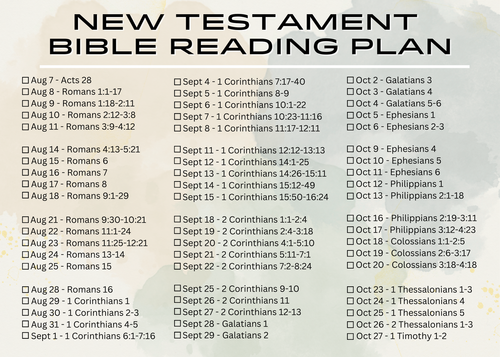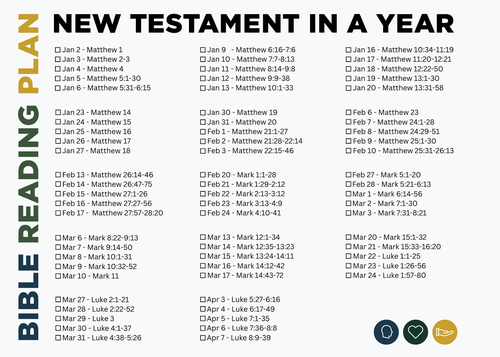Whomever He Wills
Romans 9:1-29
Paul addresses potential skepticism and emphasizes his concern for his fellow Jews. Despite their opposition to his mission work among the Gentiles, Paul expresses deep sorrow and anguish on their behalf. He even contemplates the idea of bearing God's curse if it meant their acceptance of Jesus as the Messiah.
Paul addresses the idea that the rejection of Jesus by many Jews may appear as a failure of God's Word by emphasizing that ethnic lineage alone does not guarantee salvation. The true "children of Abraham" demonstrate faith and faithfulness and that God's promises are fulfilled through embracing Jesus.
The promise of a son to Abraham and Sarah, namely Isaac, signifies that redemption lies within the patriarchal line and is brought about by God's promise, not human scheming. It is a reminder that God's redemption may surpass human understanding and seem impossible. Paul's message is clear: those who deny Jesus, even with their Abrahamic heritage, remain as "children of the flesh." He then shifts the focus from Abraham and Sarah to their son Isaac and his wife Rebekah, highlighting the fulfillment of God's promise. As the Old Testament accounts confirm, salvation is based on God's election, not human behavior. Paul affirms God's faithfulness in His saving promise and addresses the responsibility of individuals in their choices.
Paul addresses objections regarding the fairness of God's actions. God is not unjust but rather merciful and compassionate. Salvation is not based on human will or effort but on God's mercy alone. He affirms the faithfulness of God's Word and rejects the notion that God's actions can be labeled as "injustice."
He shows God's sovereignty in salvation using the example of Moses and Pharaoh. Despite Pharaoh's initial disbelief, God demonstrated His power through him and intended for His name to be proclaimed throughout the earth. Paul emphasizes that Pharaoh bears responsibility for his condemnation, but God's mercy is displayed whenever the law is read. Paul concludes by affirming that there is no injustice on God's part but rather merciful consistency.
Paul anticipates a potential objection to his answer (vv. 15-18) regarding the previous rhetorical question raised (v. 14). In Paul's mind, and he envisions a one-on-one interaction with an individual questioning God's goodness. The rhetorical question consists of two parts: (1) Why does God continue to blame or find people guilty? Because (2), as Paul stated (v. 18), God hardens whomever he wishes. And "Who can resist his will?" Paul perceives an impious attitude behind the question, daring to question and blame God. A modern reader might easily cast Paul in a negative light due to the apostle's self-assurance. However, this overlooks the foundation of his confidence, which lies not in himself or his logic but in God's written Word. Anyone who approaches God with such arrogance as to ignore their sin (Isa. 29:15) or to invert their roles (Isa. 29:16) cannot tap into God's abundant mercy. God puts humanity in question, not the other way around.
Paul points to Jeremiah 18. In this passage, God instructs Jeremiah to observe a potter handling clay "as it seemed good to the potter to do" (Jer. 18:4). The point is not that God shows mercy or hardens by inscrutable decree. Instead, the potter (God) has incorporated into his plan of salvation a judgment that can be reversed if people (the clay pots) respond to his self-revelation, examine their ways, and turn to him. Under such gracious terms, God has every right to show mercy or to harden.
If a people, like the Gentiles, are condemned but turn to God, He promises to relent from the intended disaster. Conversely, if a people, like the Jews, have favorable prospects but do evil in God's sight, He will relent from the intended good. God's is just in condemning some and saving others, refuting claims of injustice. This has always been His stance towards sinful humans. God deals with kindness and severity, demonstrating His redemptive reign. Paul supports his argument by referencing Hosea 2:23, Hosea 1:10, and Isaiah 10:22. He emphasizes that God's people include both Jews and Gentiles and that the gospel has been revealed to all nations and affirms that the gospel fulfillment is not a betrayal of God's Word but a glorious fulfillment of it.
Paul addresses the idea that the rejection of Jesus by many Jews may appear as a failure of God's Word by emphasizing that ethnic lineage alone does not guarantee salvation. The true "children of Abraham" demonstrate faith and faithfulness and that God's promises are fulfilled through embracing Jesus.
The promise of a son to Abraham and Sarah, namely Isaac, signifies that redemption lies within the patriarchal line and is brought about by God's promise, not human scheming. It is a reminder that God's redemption may surpass human understanding and seem impossible. Paul's message is clear: those who deny Jesus, even with their Abrahamic heritage, remain as "children of the flesh." He then shifts the focus from Abraham and Sarah to their son Isaac and his wife Rebekah, highlighting the fulfillment of God's promise. As the Old Testament accounts confirm, salvation is based on God's election, not human behavior. Paul affirms God's faithfulness in His saving promise and addresses the responsibility of individuals in their choices.
Paul addresses objections regarding the fairness of God's actions. God is not unjust but rather merciful and compassionate. Salvation is not based on human will or effort but on God's mercy alone. He affirms the faithfulness of God's Word and rejects the notion that God's actions can be labeled as "injustice."
He shows God's sovereignty in salvation using the example of Moses and Pharaoh. Despite Pharaoh's initial disbelief, God demonstrated His power through him and intended for His name to be proclaimed throughout the earth. Paul emphasizes that Pharaoh bears responsibility for his condemnation, but God's mercy is displayed whenever the law is read. Paul concludes by affirming that there is no injustice on God's part but rather merciful consistency.
Paul anticipates a potential objection to his answer (vv. 15-18) regarding the previous rhetorical question raised (v. 14). In Paul's mind, and he envisions a one-on-one interaction with an individual questioning God's goodness. The rhetorical question consists of two parts: (1) Why does God continue to blame or find people guilty? Because (2), as Paul stated (v. 18), God hardens whomever he wishes. And "Who can resist his will?" Paul perceives an impious attitude behind the question, daring to question and blame God. A modern reader might easily cast Paul in a negative light due to the apostle's self-assurance. However, this overlooks the foundation of his confidence, which lies not in himself or his logic but in God's written Word. Anyone who approaches God with such arrogance as to ignore their sin (Isa. 29:15) or to invert their roles (Isa. 29:16) cannot tap into God's abundant mercy. God puts humanity in question, not the other way around.
Paul points to Jeremiah 18. In this passage, God instructs Jeremiah to observe a potter handling clay "as it seemed good to the potter to do" (Jer. 18:4). The point is not that God shows mercy or hardens by inscrutable decree. Instead, the potter (God) has incorporated into his plan of salvation a judgment that can be reversed if people (the clay pots) respond to his self-revelation, examine their ways, and turn to him. Under such gracious terms, God has every right to show mercy or to harden.
If a people, like the Gentiles, are condemned but turn to God, He promises to relent from the intended disaster. Conversely, if a people, like the Jews, have favorable prospects but do evil in God's sight, He will relent from the intended good. God's is just in condemning some and saving others, refuting claims of injustice. This has always been His stance towards sinful humans. God deals with kindness and severity, demonstrating His redemptive reign. Paul supports his argument by referencing Hosea 2:23, Hosea 1:10, and Isaiah 10:22. He emphasizes that God's people include both Jews and Gentiles and that the gospel has been revealed to all nations and affirms that the gospel fulfillment is not a betrayal of God's Word but a glorious fulfillment of it.





Recent
Archive
2023
January
Happy New Year!He Will Save His People From Their SinsMy Beloved SonTemptation And MinistryThe SermonLeaving, Lying, Limits, Love, Largesse, and The Lord's PrayerTreasure, Anxiety, and JudgmentAstonishing AuthorityStorms, Demons, and HealingJesus Is CompassionateHis Eye Is On The SparrowSwords, Rewards, and MessengersThe Lord of the SabbathBlasphemy, Bad Trees, Signs, and FamilyStories, Sowers, and SoilsParables, Hidden Treasure, and RejectionFame, Food, Fear, Faith, and FringeReal Issues And The Power Of GodDying To Find LifeLike The SunChildren, Temptation, Sheep, And ForgivenessMarriage, Kids, And MoneyTo Serve And Give His Life
February
The ArrivalStories That StingQuestion TrapsHidden Motives And LamentThe End...?UnexpectedReady?Punishment, The Plot, And PerfumeTreachery, Passover, and The CupBetrayal, Injustice, And DenialThe Field Of Blood And The GovernorCrucifixion And DeathAll AuthorityMark—The Beginning Of The GospelHealing, Preaching, And The Forgiveness Of SinEating With Tax Collectors, Fasting, The Sabbath, And An Escape BoatThe Twelve, Blasphemy, Family, And A ParableParables And PowerA Different Kind Of StormPower Had Gone Out
March
Death, Hunger, And MiraclesCommandment Or TraditionDo You Not Yet Understand?The Christ And A Glimpse Of His GloryUnbelief, Confusion, And SinDivorce, Children, And PossessionsTo Give His Life As A RansomHosannaThe Rejected Stone, Taxes, And The Great CommandmentDestruction And The EndNo One Knows, An Anointing, And A Promise To BetrayPassover And GethsemaneThe Kiss, Arrest, And DenialPilate, Simon, And The CrucifixionDeath, Burial, Resurrection, And What\'s NextTheophilus And A Visit From GabrielMary And The MagnificatBenedictusThe Arrival And The ShepherdsSimeon, Anna, And The SpiritFruits Keeping With Repentance And BaptismThe Wilderness, Nazareth, And CapernaumSimon's Mother-In-Law, Fishing, A Leper, And Sins
April
Tax Collectors, Fasting, Sabbath Controversies, And The TwelveWhy Do You Call Me Lord, Lord?Jesus Marveled, A Raised Son, And QuestionsA Sinful Woman And A ParableObeying The Word, A Storm, And DemonsTwelve Years, Twelve Apostles, And SpeculationGreater, Costly, And GloryNot Getting It, The Cost, And AppointedWoes, Neighbors, And What Is NecessaryHelp Us Pray And A Divided Kingdom?Signs, Lights, And WoesHypocrisy, Fear, A Fool, And AnxietyParables, Division, And The TimesWarnings, A Daughter Of Abraham, And Jerusalem, JerusalemA Son Or An Ox, Parties, And DiscipleshipLost ThingsThe Dishonest Manager, The Law, And Anguish In This FlameMillstones And Mustard SeedsPersistent Prayer, Humility, A Childlike Faith, And The Rich RulerEverything That Is Written, A Blind Beggar, And A Wee Little Man
May
A Parable, A Colt, A Prophecy, And A CleansingAuthority, Wicked Tenants, And TaxesThings To Beware Of And WidowsDestruction, Persecution, The Son Of Man, And WatchingThe Plot, Betrayal, Lord's Supper, And Inappropriate BehaviorPrediction, Fulfillment, Agony, Betrayal, And DenialMistreated, Taken Before The Council, Pilate, Herod, And Delivered To Be CrucifiedCrucifixion, Death, And BurialHe Is Not HereDisbelieved For JoyIn The Beginning…The Lamb Of God And A WeddingZeal, What's Inside, And Born AgainHe Must Increase
Categories
no categories
Tags
no tags
